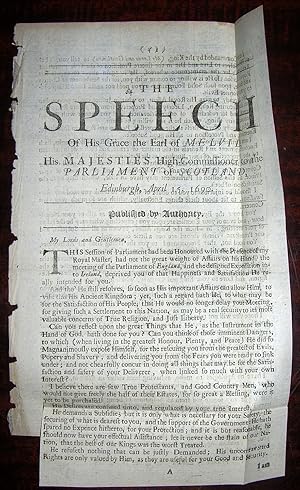Descripción
MELVILLE, George Melville, Earl of (1636 1707). The Speech Of His Grace the Earl of Melvil, His Majesties High-Commissioner to the Parliament of Scotland, Edinburgh, April 15, 1690. Printed by Edward Jones in the Savoy, 1690. Single sheet (12 x 7 inches), printed on both sides (disbound, folded). Second edition. Originally published in Edinburgh as: "The speech of His Grace George Earl of Melvill, Their Majesties high commissioner; at the opening of the second session of the first Parliament of Their Majesties antient kingdom of Scotland. The 15th of April, 1690" Melville was in London when "William and Mary were crowned as king and queen of Scotland. On 13 May 1689 he was appointed sole secretary of state for Scotland, securing the position from his rival Sir James Montgomerie of Skelmorlie, a militant presbyterian and the leader of the Club . Melville's moderate presbyterianism appears to have satisfied episcopalians, who were wary of Montgomerie's more militant stance. He took the oath at Hampton Court on 23 September 1689. On 21 January 1690 Melville was named as an exchequer commissioner in Scotland, and on 26 February he was appointed high commissioner to the forthcoming second session of William's and Mary's parliament in Scotland. Returning to Edinburgh between 8 March and 10 March 1690, he first attended the privy council on 10 March. On 8 April 1690 he was created earl of Melville, viscount of Kirkcaldy, and Lord Raith, Monymail, and Balwearie. "Melville continued as a high commissioner in the second session of the Williamite parliament in Scotland, apparently to the satisfaction of both people and king. His speech to the assembled estates on 15 April 1690 [as here] referred to William as the Instrument in the Hand of God who did so magnanimously expose Himself for the Rescuing you from the greatest of evils, Popery and Slavery; and Delivering you from the Fears you were ready to sink under and expressed his own intire Faithfulness to the King my Master, a sincere respect to you, and a zealous application for promoting of the true Religion, and Common good of all (APS, 9, appx, 38). The strident demands of the Club for constitutional reform and a presbyterian church made the securing of a settlement for the king difficult, but Melville presided over the abolition of the controversial lords of the articles (8 May) and the legislation re-establishing presbyterian church government of the church of Scotland (7 June). Legislation passed in July rescinding forfeitures and fines resulted in Melville, among others, receiving back his land and estates. However, King William was displeased at the Scottish religious settlement with its concentration of power in the hands of a militant minority of presbyterian ministers and its failure to grant liberty to conscience. Although Melville had probably done the best he could, given the atmosphere in the Edinburgh parliament, his position was weakened, especially at the English court. None the less, he continued as secretary of state and he was high commissioner to the short parliamentary session of 3 10 September 1690" (John R. Young for DNB). ESTC R16337. Catalogued by Kate Hunter. N° de ref. del artículo 72lib1321
Contactar al vendedor
Denunciar este artículo
![]()
